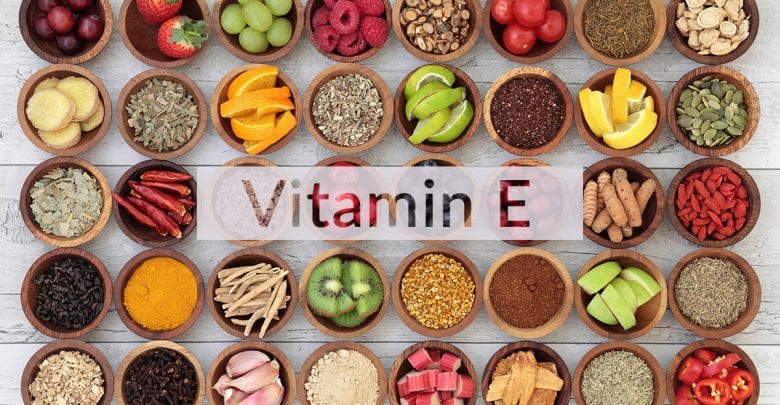
Why Is Vitamin E Important to Your Health?
أهمية فيتامين “هـ”
What Dr. Haas Says About Vitamin E
When it comes to vitamins, Dr. Elson M. Haas wrote the book—literally. That book is Staying Healthy with Nutrition: The Complete Guide to Diet and Nutritional Medicine. Here’s what he has to say about vitamin E.[5]
“Vitamin E, as its various tocopherol forms, is found in both plant and animal foods. In general, the animal sources of E are poor, found in butter, egg yolk, milk fat, and liver. The best sources of vitamin E are the vegetable and seed or nut oils.”
“The oil component of all grains, seeds, and nuts contain tocopherol. The protective covering of the grains contains E; this is lost in the milling or refinement of grains. To preserve the vitamin E, extraction from nuts and seeds must be done naturally, as by cold pressing, rather than by heat or chemical extraction, used in food processing.”
“Because of these forms of processing, the average American diet has lost many of its natural sources of tocopherols. Intake is commonly very low. Cold-pressed vegetable oils are the best source of vitamin E. These are most healthy in their raw form in dressings and sauces rather than in cooking. Most are polyunsaturated oils, which are adversely affected by heating.”
The specific levels of vitamin E in foods relate to the content of linoleicand linolenic acids[6] — our most essential fatty acids.
Consuming Vitamin E Through Diet
Dr. Haas also explains this about the vitamin E content in certain foods:
“The content of alpha-tocopherol varies among different foods and oils. Safflower oil is one of the best sources — about 90 percent of the E being alpha. Corn oil has only about 10 percent alpha-tocopherol. Other foods that contain significant amounts of vitamin E are soybeans, margarine, uncooked green peas, spinach, asparagus, kale, cucumber, tomato, and celery.”
If possible, it’s always best to get your vitamins from plant-based foods instead of supplements[7], which can be made from synthetic ingredients. Here are some of the best food sources of vitamin E.[8]
| The Best Food Sources of Vitamin E | ||
|---|---|---|
| Food | Milligrams (mg)per serving | % of Recommended Daily Value |
| Wheat germ oil, 1 tablespoon | 20.3 | 100 |
| Sunflower seeds, dry roasted, 1 ounce | 7.4 | 37 |
| Almonds, dry roasted, 1 ounce | 6.8 | 34 |
| Sunflower oil, 1 tablespoon | 5.6 | 28 |
| Safflower oil, 1 tablespoon | 4.6 | 25 |
| Hazelnuts, dry roasted, 1 ounce | 4.3 | 22 |
| Peanut butter, 2 tablespoons | 2.9 | 15 |
| Peanuts, dry roasted, 1 ounce | 2.2 | 11 |
| Spinach, boiled, ½ cup | 1.9 | 10 |
| Broccoli, chopped, boiled, ½ cup | 1.2 | 6 |
| Kiwifruit, 1 medium | 1.1 | 6 |
| Mango, sliced, ½ cup | 0.7 | 4 |
| Tomato, raw, 1 medium | 0.7 | 4 |
| Spinach, raw, 1 cup | 0.6 | 3 |
Additional Health Benefits of Vitamin E
When it comes to health benefits, vitamin E is probably best known for its antioxidant properties.[9] Antioxidants counteract free radicals [10] and free radicals cause oxidative stress.[11]Oxidative stress can cause a host of serious health issues, including neurodegenerative disease.[12]Antioxidants can help prevent and repair cell damage. Dr. Haas explains:
“Free radical formation comes from a variety of chemical reactions in the body and is the basis of many diseases, such as heart disease, hypertension, arthritis, senility, and probably even cancer. Without vitamin E, cell membranes, and DNA are less protected from free radical damage.”
“Vitamin E as an antioxidant helps to stabilize cell membranes and protect the tissues of the skin, eyes, liver, breast, and testes. It protects the lungs from oxidative damage from environmental substances. Free radical formation and oxidation are tied to cancer development… More definitive research is needed.”
“It helps heart and muscle cell respiration by improving function with less oxygen. Vitamin E may improve stamina and endurance and reduce cardiovascular disease. Vitamin E reduces platelet aggregation and platelet adhesiveness to collagen, even more than aspirin.”
Supplementing to Consume Antioxidants
Following a diet heavy on fresh fruits and vegetables, plenty of water, and avoiding processed food and refined sugar will usually ensure you receive adequate antioxidants. For additional antioxidant support, I recommend plant-based supplements. Antioxidants are only one of the benefits that vitamin E has to offer. Let’s check out a few more ways this vitamin can support your health.
Other Uses for Vitamin E
Dr. Haas explains other uses for vitamin E:
“Its antioxidant effect reduces thrombin formation and helps decrease blood clotting. It also appears to minimize platelet (blood-clotting component) aggregation and stickiness. This either generates or perpetuates the atherosclerotic process.”
“Vitamin A and E together can help decrease cholesterol and general fat accumulation. To assist in healing and minimize clotting, tocopherol is a useful nutrient before and after surgery, limited to dosages of 200-300 IUs per day. Higher amounts may actually suppress the healing process.”
Vitamin E also boasts topical benefits in skin care[13], and there are actually several vitamin E-based skin care product lines. Many are moisturizers and nourishing creams that help repair skin lesions, ulcers, and burns. Vitamin E can help heal or diminish scars caused by injury or surgery. And, according to Dr. Haas, that’s not all:
“Vitamin E may be very helpful to women. Research shows relief from menstrual pains, as well as general relief from various menstrual disorders. Many problems of menopause, such as headaches, hot flashes, or vaginal itching due to dryness, may be reduced with the use of supplemental vitamin E.”
It also appears that vitamin E could help with shingles[14], eye complications[15], menstrual migraines[16], fatty liver disease[17], muscular dystrophy[18], leg cramps, restless leg syndrome[19], and circulatory issues caused by diabetes.[20] Vitamin E is not a cure-all miracle tonic, but it does play a significant role in maintaining good health.
How Much Vitamin E Do I Need?
It seems the average American diet could use a bit more vitamin E. Here’s what Dr. Haas has to say about how much vitamin E we should be consuming:
“The amount of vitamin E required varies with body size and amount of polyunsaturated fats in the diet. Vitamin E is needed to protect these fats from oxidation. More is needed when any refined oils, fried foods, or rancid oils are consumed. Supplemental estrogen or estrogen imbalance in women increases the need for vitamin E, as does air pollution.”
“Vitamin E should not be taken with iron, especially inorganic iron, such as ferrous sulfate or the iron added to food products. Selenium, another important antioxidant, however, may increase the potency of vitamin E.”
“Even though the RDA for vitamin E is low, many people do not consume enough in their diet alone.”
“Approximately 400-600 IUs is used preventively. For therapeutic effects, an amount between 800-1600 IUs daily is suggested. With therapeutic uses of vitamin E, it is best to start with a low level and gradually increase it. Levels over 1,600 IUs per day are not recommended unless there is close medical supervision.”
Consult this chart for day-to-day, healthy vitamin E levels.[8]
| Recommended Dietary Allowances of Vitamin E | ||||
|---|---|---|---|---|
| Age | Males | Females | Pregnancy | Lactation |
| 0–6 months | 4 mg (6 IU) | 4 mg(6 IU) | ||
| 7–12 months | 5 mg (7.5 IU) | 5 mg (7.5 IU) | ||
| 1–3 years | 6 mg (9 IU) | 6 mg (9 IU) | ||
| 4–8 years | 7 mg (10.4 IU) | 7 mg (10.4 IU) | ||
| 9–13 years | 11 mg (16.4 IU) | 11 mg (16.4 IU) | ||
| 14+ years | 15 mg (22.4 IU) | 15 mg (22.4 IU) | 15 mg (22.4 IU) | 19 mg (28.4 IU) |
| IU = International Units | ||||
If you have high blood pressure, you may want to avoid large servings of vitamin E as it can raise blood pressure. However, 400 IUs daily is typically not excessive. If you have high blood pressure and plan to start vitamin E supplementation, monitor your body and blood pressure. As always, consult your healthcare practitioner before starting any supplementation program.
source: globalhealingcenter.com
فيتامين “هـ” أو “E” من الفيتامينات التي تجنبك من مشاكل صحية مثل مشاكل القلب، كما يمنحك النشاط ويقلل من الشعور بالتعب والإرهاق.
ويعمل فيتامين “هـ” كمضاد للأكسدة ويساعد الخلايا من التلف والوقاية من أمراض السرطان والقلب وألزهايمر والسكتات الدماغية، ويساعد على تقليل تساقط الشعر وزيادة تدفق الدماء في فروة الرأس، ويحميه من الجفاف.
ويمكنك تناول فيتامين “هـ” من خلال كبسولات توجد في الصيدليات، أو تناول المكسرات و الخطروات الورقية مثل الخس والجرجيير، وأيضا الأفوكادو والكيوي والمانجا.;



